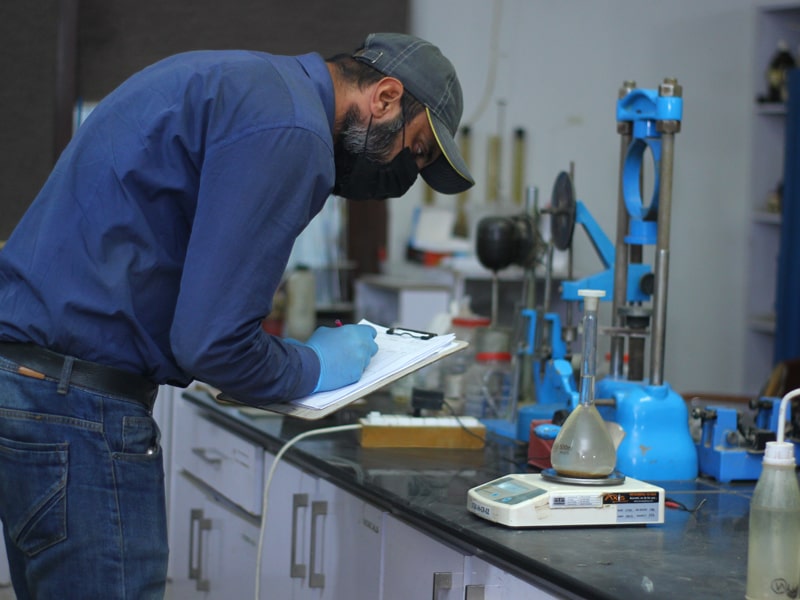Advanced Testing
Electrical Resistivity Tomography
Resistivity surveys are used to characterize sub-surface materials in terms of their electrical properties. Variations in electrical resistivity, or conductivity, typically relate to changes in geology. Changes also occur due to the presence of water which can provide information on water saturation, fluid conductivity, porosity and permeability. Knowing these parameters allows for mapping of stratigraphic units, geological structures, sinkholes, fractures and groundwater profiles.
The survey equipment comprises of a string of electrodes at regular intervals which are connected to a central control box. Current is passed into the ground via a pair of electrodes and the accompanying array of electrodes detects return signals. Analysis of these currents enables electrode pairs to determine the apparent resistivity along the receiver line.
The recorded data is downloaded and analyzed to produce cross-sectional models of the ground, typically presented as color contour maps displaying the variation in resistivity. Interpretation of the data provides greater understanding of the sub-surface conditions and the data can be cross-referenced with other geophysical surveys or borehole profiles to provide calibration and confirmation of data analysis.

Cone Penetration Testing
STS is the only company in Pakistan that offers cone penetration testing (CPT). The CPT is a fundamental geotechnical investigation method that assesses soil properties in a non-destructive manner. The CPT provides a rapid, reliable and economical means of determining soil stratigraphy, relative density, strength information (static and dynamic pore pressure, hydraulic conductivity). STS’s skilled and knowledgeable operators can retrieve data at a faster rate even in difficult conditions, allowing less time on the job and a lower cost to the client.
With advanced equipment and precise data collection methods, our CPT services offer detailed insights into subsurface conditions. The results are analyzed and integrated into geotechnical models, contributing to informed decision-making and the successful execution of construction and infrastructure projects.
Electrical Resistivity Survey
Soil resistivity testing measures the capacity of the ground to pass an electrical current. This property utilizes the electrical power industry for assessing the design requirements of earthing systems. STS provides soil resistivity testing services to assist in the design and installation of power generation plant, substations and engineering infrastructure.
The correct measurement of soil resistivity is particularly important in high resistivity ground. Specifically, where electrical currents do not dissipate readily. In such ground conditions achieving a good earth can be problematic. Information on ground resistivity is required in much greater depths for the successful installation of an earthing system
Pressure Meter Test
Pressure meter testing is an essential tool for assessing the small strain modulus of soils in both offshore and onshore geotechnical engineering.
Pressuremeter testing is an accurate in situ testing method for measuring a range of soil properties. Its prime use is in determining the in-situ strength and stiffness of soils and rocks.
Pressure meter (also referred to as High-Pressure Dilatometer (HPD testing) is used in a pre-bored pocket making the test relatively simple to perform in many ground conditions.
Downhole Seismic Test
Downhole seismic testing involves the deployment of seismic sensors into boreholes to capture and interpret seismic waves. An external seismic energy source, such as a hammer striking a plate, is applied adjacent to the borehole on the ground surface. Clamping geophones in borehole measure the one-way travel time of the initial arrival of the generated seismic energy, and the distribution of compression and the shear wave velocity as a function of depth in the vicinity of the borehole.
Through the application of downhole seismic techniques, our services contribute to a more accurate understanding of the subsurface, providing valuable data for foundation design, site characterization, and seismic hazard assessments in diverse geotechnical contexts. Our tests conform to ASTM standards.
Soil Thermal Resistivity
Soil thermal resistivity testing measures the capacity of the ground to conduct or dissipate heat. A correct understanding of the thermal properties of a soil or layer of made ground is important for the design and installation of underground pipelines and transmission cables, to avoid premature failures. The heat produced by current flowing through an underground power cable must be properly dissipated.
The thermal resistivity of a soil will determine whether a buried power cable remains cool or overheats. A build-up of heat around the cable can reduce transmission efficiency, or in the worst cases cause the cable to melt. Potential problems can be identified by measuring the thermal resistivity of an in-situ soil. Remedial measures include changing the capacity and insulation of the cables or installing corrective thermal backfills in the cable trench.
Typical Applications:
- Assists the design and layout of underground pipelines
- Prevents occurrence of heat build-up around power transmission cables
- Measures the ground’s heat dissipation properties for a pipeline installation
- Calculates the optimum cable specifications for the local ground conditions
- Determines if in-situ ground must be replaced by cable bedding thermal back-fill
